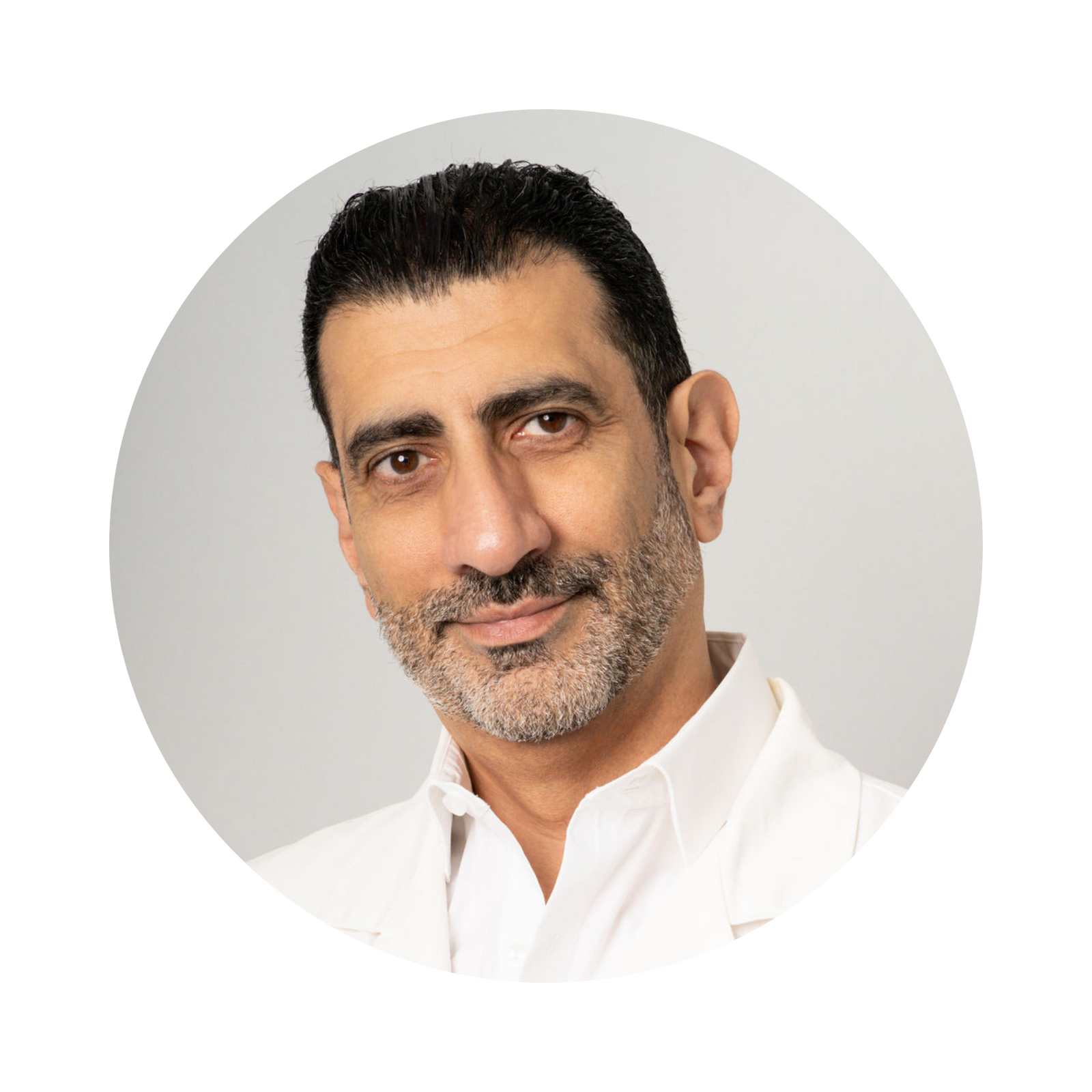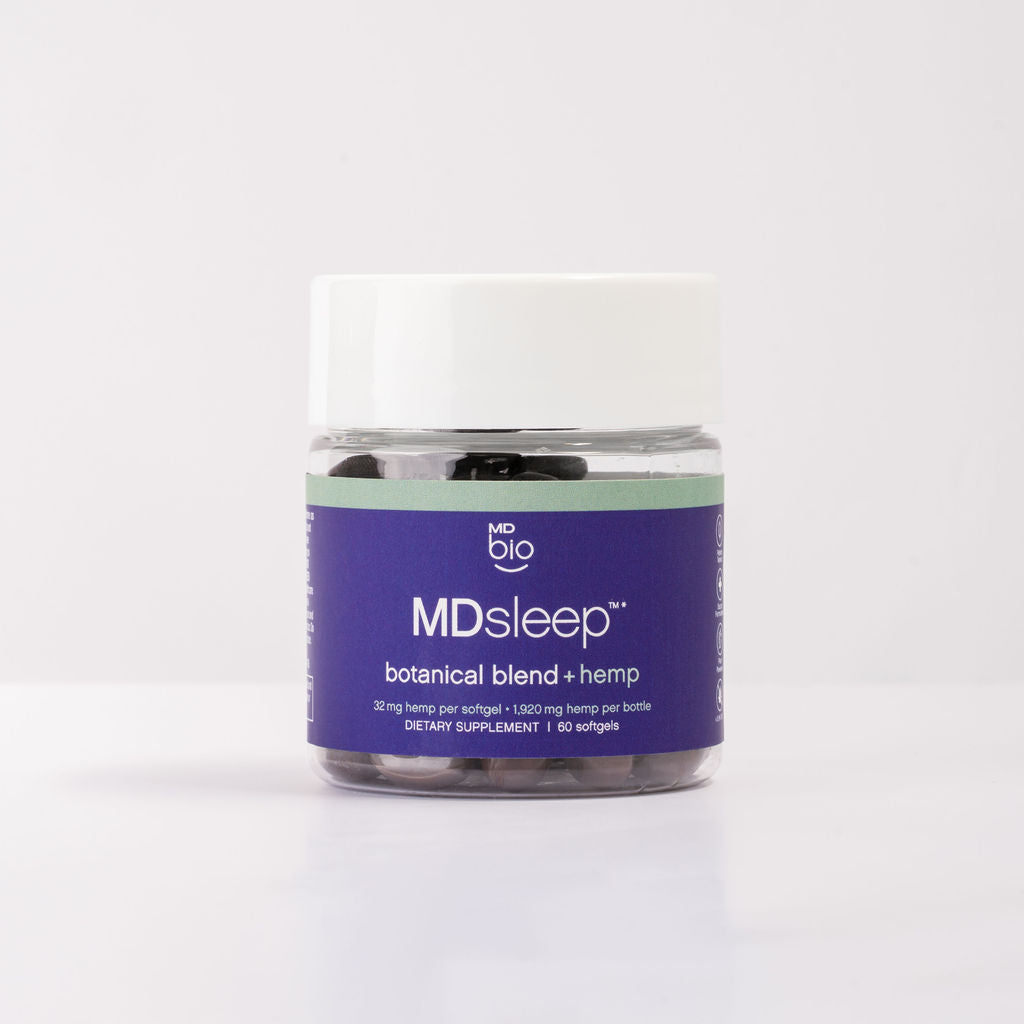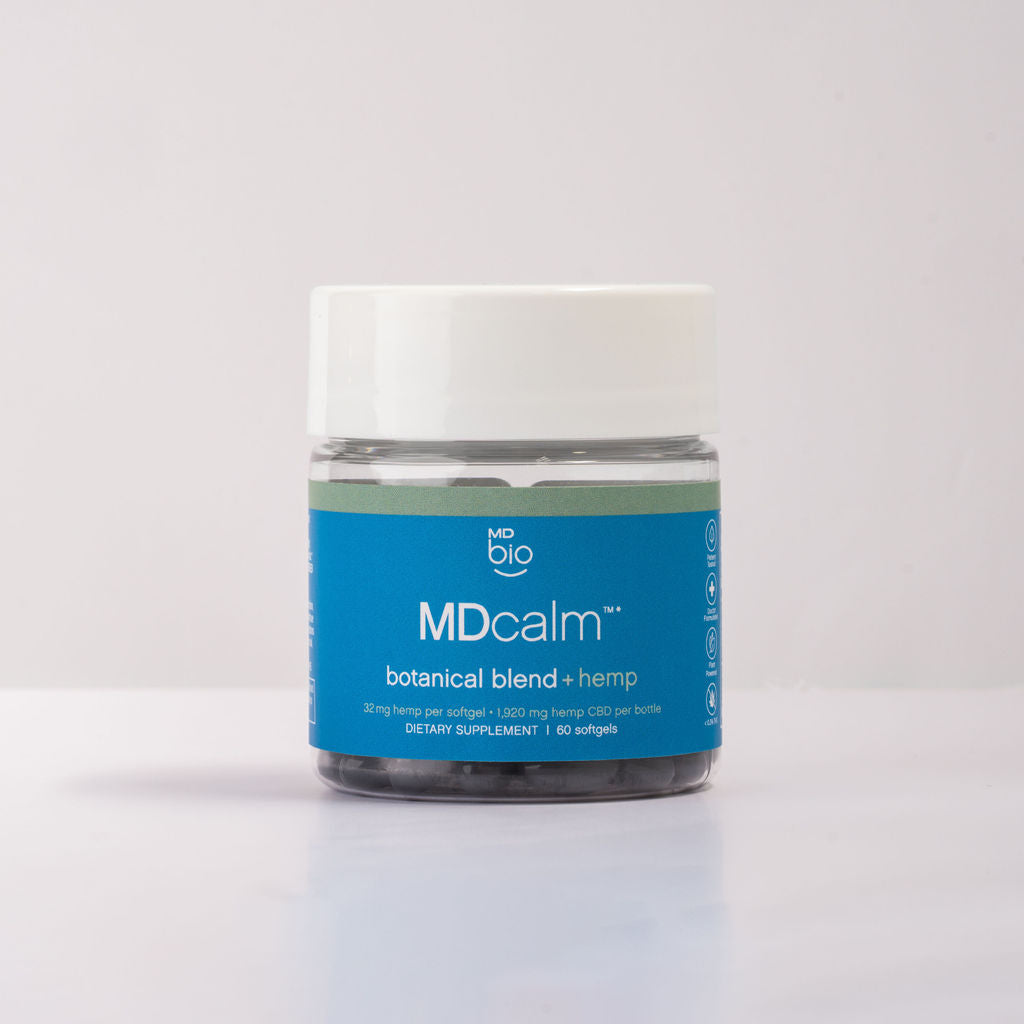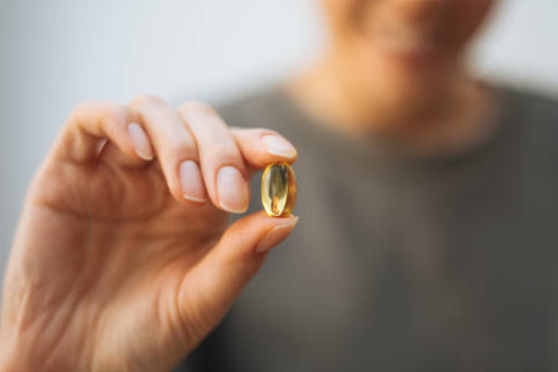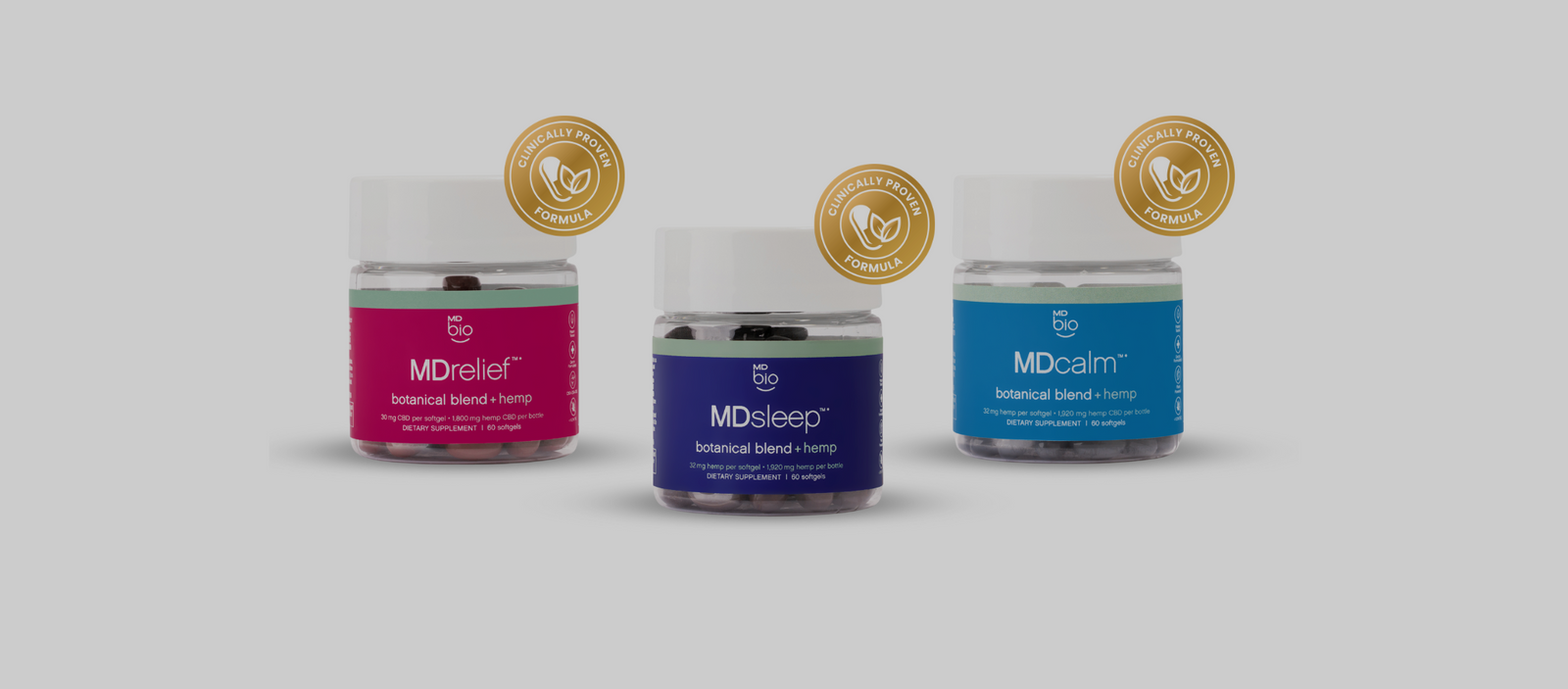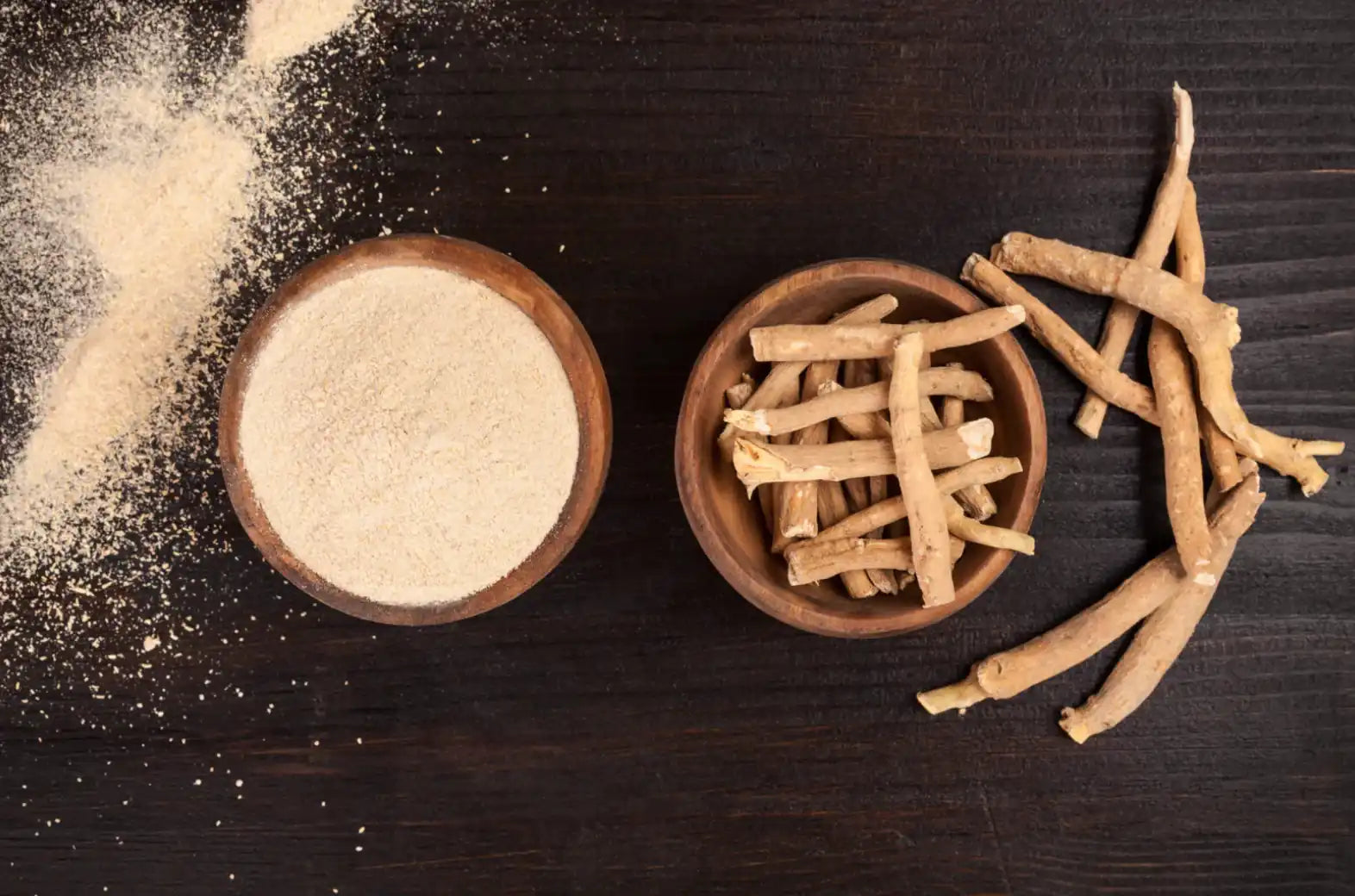
Ashwagandha has been an alternative medicine mainstay for thousands of years. The herb is said by alternative health practitioners to have several benefits, especially in reducing stress and anxiety.
This plant is not a one-trick pony, however. It can help with several other conditions, including mental health conditions, fertility issues, inflammation in the body, high blood sugar, brain fog, and sleep conditions such as insomnia.
Ashwagandha is a key ingredient in our MDCalm product, which means you can easily absorb all the benefits just by taking the supplement.
Let’s discover more about this remarkable plant and why taking it in MDCalm supplement form is worth your while.
About Ashwagandha
Ashwagandha is a small bush that has yellow flowers. It is originally from Southeast Asia and India. The botanical name for the ashwagandha plant isWithania somnifera.It is also known as “winter cherry” and “Indian ginseng,” amongst other titles.
The ashwagandha herb is used extensively in Ayurveda practices. Ayurveda follows traditional Indian philosophies of alternative healing. Translated from the original Sanskrit, ashwagandha means “smell of the horse.” The name refers to the herb’s smell and potential to make people as healthy and strong as a horse.
Healers use a powder or extract derived from the herb’s leaves or roots to address health conditions. MDCalm contains ashwagandha extract, amongst other health-boosting herbs and supplements.
Ashwagandha for Stress
People typically know ashwagandha best for its stress reduction benefits. The herb is categorized as an adaptogen, a substance that can assist the body with managing stress.
Research suggests the herb may help regulate stress mediators in the body and thereby stress responses.
Ashwagandha Anxiety Treatment
Research also indicates that the herb may reduce anxiety and stress levels. One study showed that participants who took between 250 and 600mg a day of the supplement for two months had lower levels of cortisol, the stress hormone, compared with the placebo group. The ashwagandha anxiety treatment participants also had improved sleep.
Another analysis showed that people who took 240mg for 60 days also experienced a reduction in their anxiety levels.
However, research is still being conducted to ascertain the best dosage for stress and ashwagandha anxiety management.
How Long Does Ashwagandha Take to Work for Stress and Anxiety
Like with many alternative medicines, taking ashwagandha for stress and anxiety can take time to start to have an effect. It may take two or three days or even a few weeks to start noticing a difference in your anxiety and stress levels.
The present research suggests it could take as long as ten weeks, or even more, for patients to feel an optimal reduction in stress levels.
Readily Available and Safe to Use
Ashwagandha is generally considered a safe extract to take, and it is easy to find. Many supplement manufacturers use it in their products, and many retailers have it available for sale. You can find supplements online or at vitamin stores or health shops.
One extensive review of the plant’s uses revealed it is safe for most people to take for several health benefits.
You can take ashwagandha in several ways, the most popular being orally. It is often ingested with other food or swallowed with a glass of water or cool tea.
Ashwagandha Side Effects
Ashwagandha is considered safe to take orally – ashwagandha side effects are typically limited to much larger doses than you'll find in a trustworthy health supplement. There is not enough research on file, however, to understand potential side effects in the long term.
If you are taking larger doses of the herb, you may experience some minor side effects. These include:
- Nausea
- Vomiting
- Stomach discomfort
- Diarrhoea
In rare cases, people can also experience mild liver issues.
Some people take ashwagandha by applying it to the skin. There is insufficient research to show whether this is a safe method or if there are any specific side effects. If you're concerned about ashwagandha side effects, you should consult your primary care provider to learn more.
Who Should Not Take Ashwagandha
Some individuals with significant underlying health conditions should avoid taking ashwagandha. People with autoimmune conditions should avoid taking the herb. Speak to your primary healthcare provider if you're unsure about taking herbal remedies alongside pre-existing conditions.
Pregnant or breastfeeding women should also not take ashwagandha for stress or other purposes as there is little evidence to show its safety or toxicity. Ashwaghanda side effects are poorly understood in pregnant women and fetuses.
The herb could also interact with medications for blood pressure, thyroid issues, and blood sugar conditions.
It is best to remember that a lot of the research surrounding the health benefits of ashwagandha in plant, root, or supplement form is ongoing. This means seeking out high-quality information before taking the herb is essential.
If you are considering taking ashwagandha for stress or any other reason, it’s best to discuss doing so with your doctor first. A medical professional can advise you on the best course of action for your personal health circumstances and goals.
The Correct Ashwagandha Dosage
The correct dosage of ashwagandha for stress depends on a few factors. It depends on the benefits you want to achieve, how your body processes the herb, and your weight and height.
For sleep and ashwagandha anxiety usage, 250mg to 600mg per day is typically taken, while 600mg to 1000mg per day is sometimes taken for physical stamina benefits. The typical dosing practice is to take 600mg daily, divided into two doses, consumed in the morning and evening.
Studies suggest taking up to 750mg per day is safe, while more research needs to be done regarding the safety of taking 1000mg per day or more.
Our MDCalm product has a safe and optimal amount of the herb to ensure you get maximum ashwagandha benefits.
Other Ashwagandha Benefits
Ashwagandha anxiety & stress reduction is one of its most popular uses, but it may have several other health benefits. From reducing inflammation to increasing fertility and athletic performance, the ashwagandha benefits are many.
1. May Enhance Athletic Performance
Some research indicates that the ashwagandha herb may enhance physical performance as it may augment stamina and muscle strength. It may thus be a valuable supplement for anyone who has serious athletic pursuits.
This study found that women and men who take a minimal dose of 120mg and up to a maximum dose of 1250 a day experience enhanced strength and oxygen use when exercising. The herb also allowed for the maximum consumption of oxygen.
2. Could Ease Mental Health Symptoms
Besides the popular ashwagandha anxiety treatment, there have been suggestions that the herb may alleviate some mental health symptoms. Some evidence indicates the herb may reduce symptoms of conditions such as depression and even schizophrenia, although this research is ongoing.
It is also possible that the herb may positively impact cognitive function in people who suffer from bipolar disorder. Likewise, more studies are needed to verify this.
While these findings show the herb may help with some mental health conditions, it should not be taken in the place of appropriately prescribed medications. If you are struggling with your mental health, it is best to consult with a mental health professional so they can help you to get the proper treatment.
3. May Lessen Sugar Levels in the Blood
A small amount of evidence indicates that ashwagandha may help to reduce blood sugar levels in people with diabetes. A review of several studies showed that people with diabetes who took the herb had lowered insulin, blood sugar, hemoglobin A1c (HbA1c), blood lipids, and oxidative stress indicators.
Researchers also believe that some ashwagandha compounds can promote the absorption of bloodstream glucose into the cells.
Taking ashwagandha in natural or supplement form, such as it appears in MDCalm, may also help to reduce cholesterol. Studies indicate that there is evidence the plant minimizes bad cholesterol types that can cause heart disease and other heart-related conditions.
More research is needed to ascertain the effects of ashwagandha on diabetes.
4. Could Diminish Inflammation in the Body
Inflammation can lead to many issues in the body, one of the most serious of which is cancer. Taking ashwagandha might help treat inflammation.
The compounds in the herb, such as withaferin A (WA), may also help to lessen inflammation. The research suggests that WA works on inflammatory pathways and may help minimize inflammatory proteins in the body.
Some studies indicate that adults who took ashwagandha for a period of 60 days experienced massively reduced inflammatory markers.
Even though the findings in these studies are promising, more research needs to be done on the possible effects of ashwagandha on cases of inflammation.
5. May Boost Men’s Fertility
Ashwagandha benefits may include potentially increased testosterone and fertility in men. One study that focused on overweight men between 40 and 70 showed an 18% increase in the sex hormone DHEA-S, which helps produce testosterone. The men also had an increase in testosterone levels of nearly 15%.
Another study indicates that the herb boosted semen volume, sperm concentration, and sperm motility in men struggling with a low sperm count. This can help older men who are aiming to have children to impregnate their partner safely. Men with typical sperm concentration also had an increase in volume and motility.
Experts still recommend that new research be undertaken to show how the plant extract can benefit fertility.
6. Could Boost Memory and Brain Function
People experiencing problems with memory and brain function may also experience ashwagandha benefits. Taking the herb extract may help boost cognitive function.
A review of five studies found evidence that taking the herb may boost cognitive function in older adults with minor cognitive impairments and in those with schizophrenia. Results suggested the extract could improve:
- Attention span
- Reaction times
- Executive function
- Cognitive task performance
Researchers have also noted an improvement in memory and the processing of information. These benefits have been linked to antioxidant impacts on the brain by compounds in ashwagandha such as WA.
More information still needs to be gathered about the positive impacts of ashwagandha on mental functions.
7. May Help You Get Better Quality Sleep
Not getting good quality sleep can impact your health negatively in so many ways. You may struggle to focus on work and other activities and experience a decline in cellular health and efficiency over time. Taking ashwagandha for stress may help ease insomnia and other sleep problems.
In a study of older people between 65 to 80, evidence showed that taking ashwagandha improved sleep quality. It also appeared to assist with mental sharpness. Taking the root of the plant made people feel more relaxed, leading to improved sleep and alertness.
Researchers have found that people who battle insomnia responded to taking ashwagandha more positively than those who did not suffer from the condition.
Some Closing Thoughts About Ashwagandha Benefits
Ashwagandha is a versatile herb. As you can see, it may help ease, relieve, or improve the symptoms of many conditions. There are also minimal ashwagandha side effects for most population groups, making it a relatively safe supplement to try.
The herbal remedy is most easily accessed, taken, and absorbed in the form of a quality supplement such as MDCalm.
As with any medication, it is best to discuss taking ashwagandha with a registered medical professional before you try ashwagandha anxiety supplements. Your doctor can tell you whether the supplement will react with any other medication you are taking, what dosage you should adhere to, and what to expect when taking it.
- Discover the Perfect Pair: Explore the Synergy and Differences of Ashwagandha and Valerian Root in our latest blog. Dive in now at mdbiowellness.com!
- Discover natural serenity with our latest blog: 6 Herbal Remedies for Stress.
- Herbal Pain Relief: Our Favorite Herbs For Pain Relief And Inflammation


